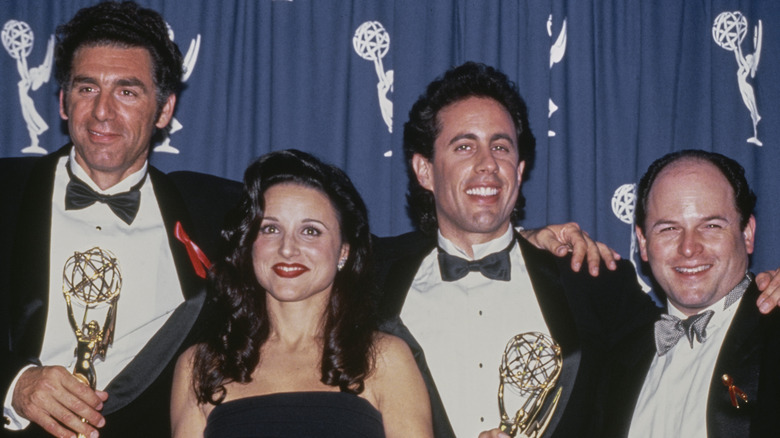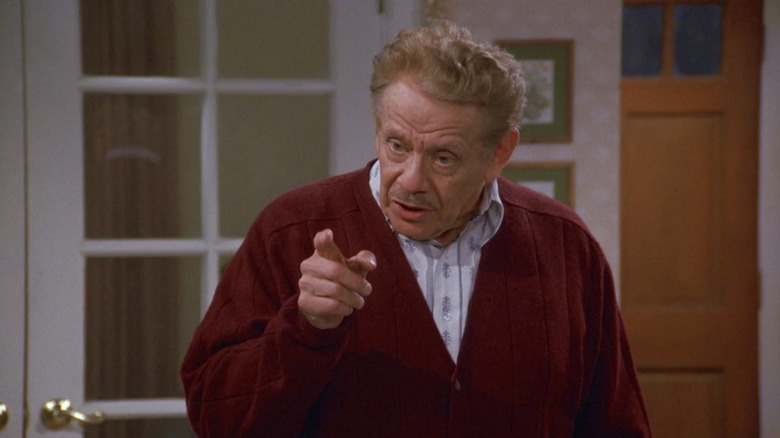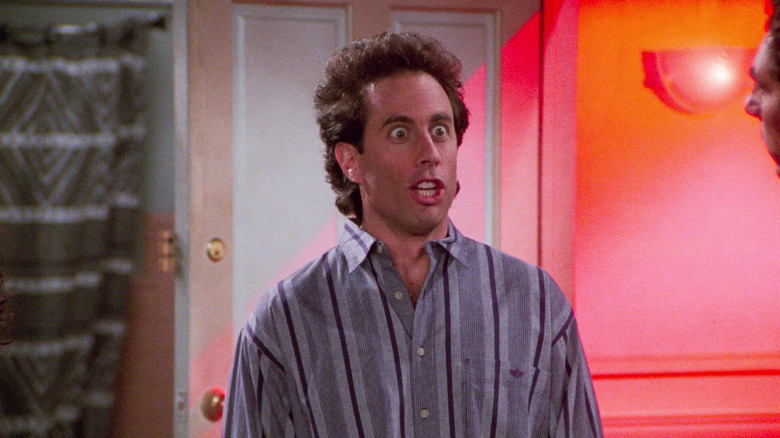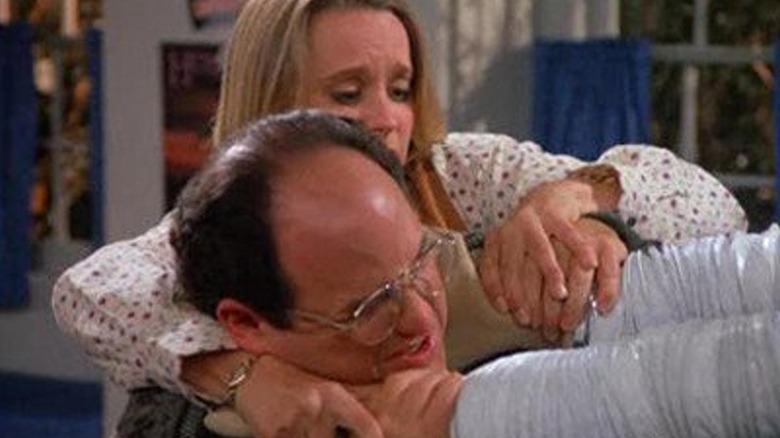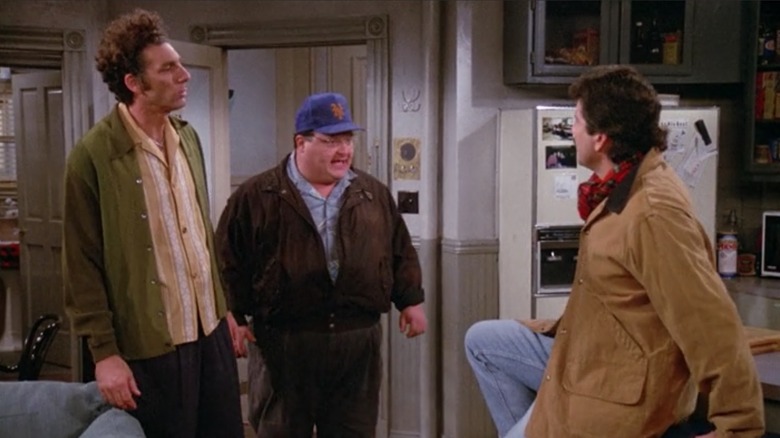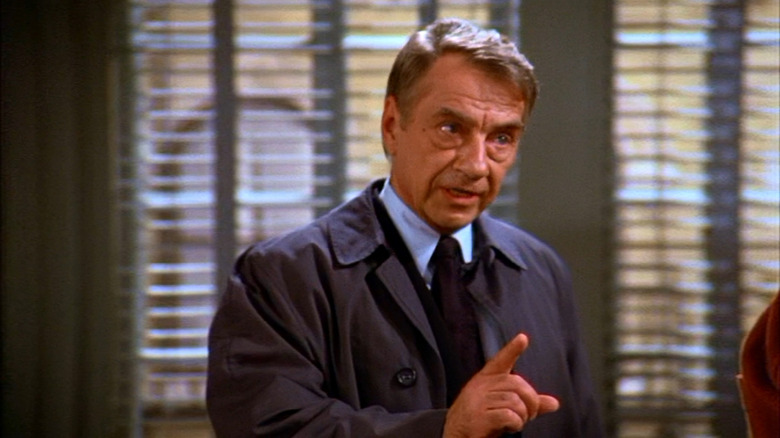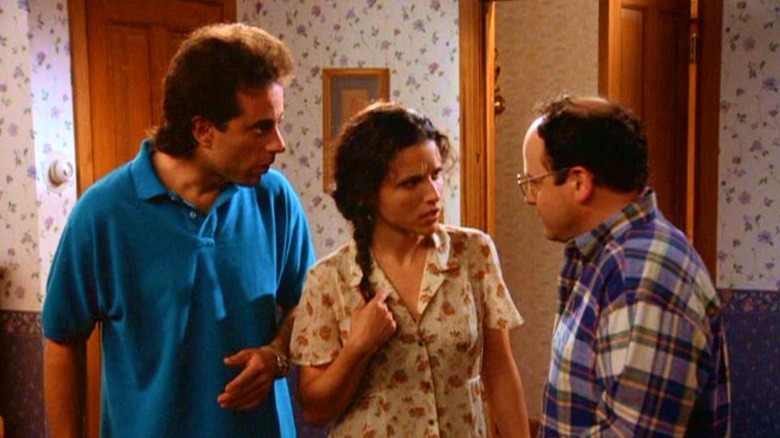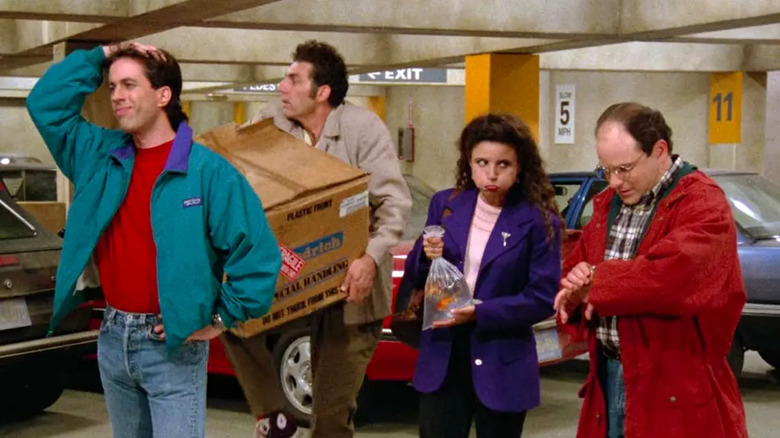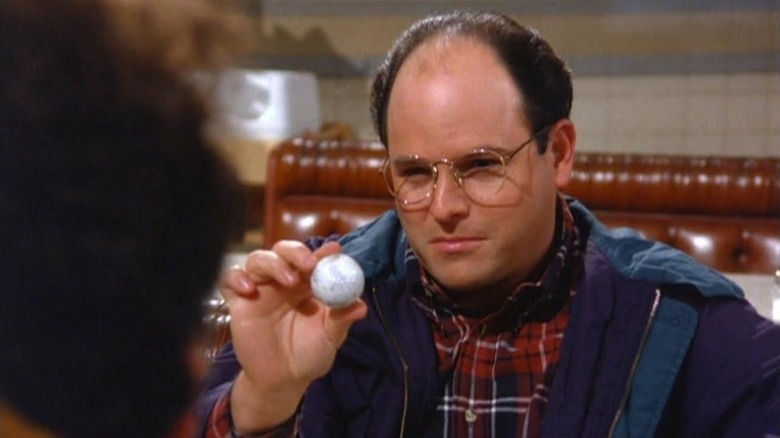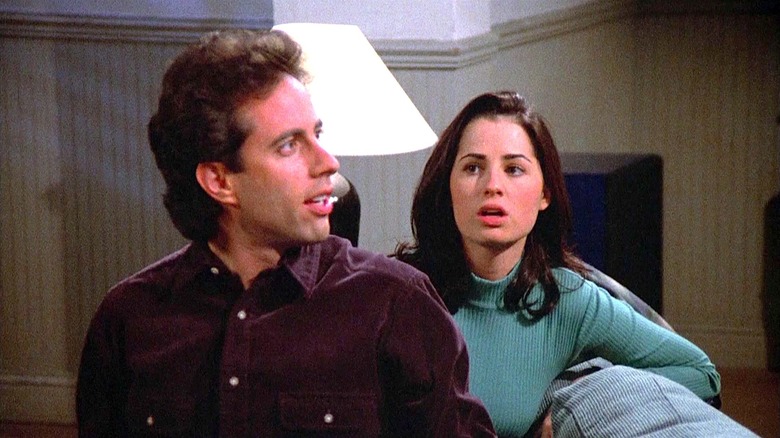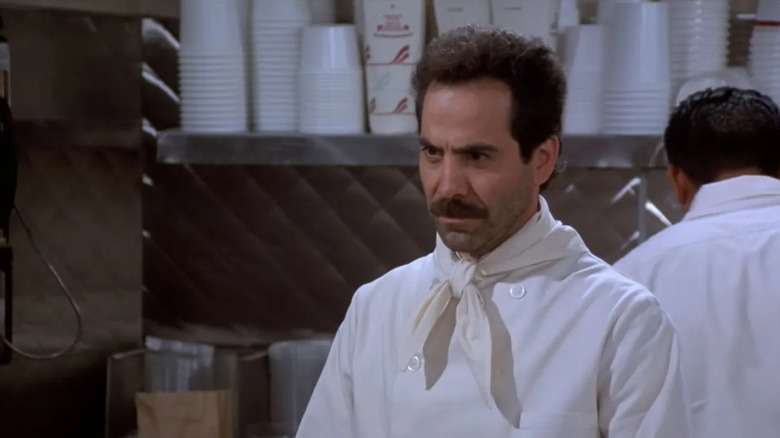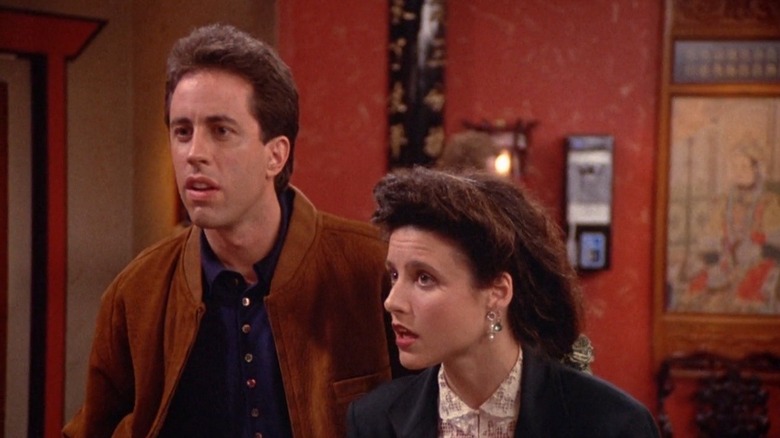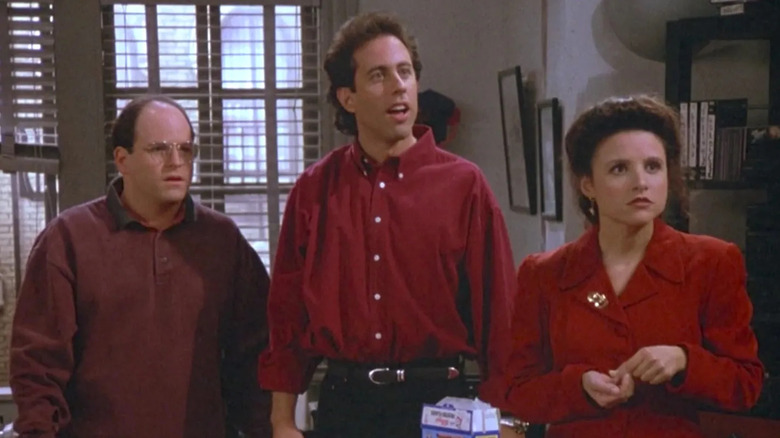The 12 Best Episodes Of Seinfeld, Ranked
For a show about nothing, "Seinfeld" sure has contributed a lot to popular culture. That's kind of a miracle when you consider that it just barely made it onto the airwaves. The brainchild of Larry David and Jerry Seinfeld, the series was conceived as a way to bring Seinfeld's observational brand of standup comedy to network television. Yet when "The Seinfeld Chronicles," as it was then called, premiered on NBC in 1989, it wasn't exactly a runaway success, and the network only ordered four episodes for its first season.
Rather than cancel it, however, they renewed it for a second season, then a third. The show grew an audience that was attuned to its idiosyncratic humor, and by Season 4, it was winning the Emmy for Best Comedy Series. In 2002, TV Guide named it the greatest television show of all time(their 2013 ranking placed it second behind "The Sopranos"), and it's been in syndication and streaming ever since.
Centering on the (mis)adventures of Seinfeld, his best friend George Costanza (Jason Alexander), his ex-girlfriend Elaine Benes (Julia Louis-Dreyfus), and his wacky neighbor Cosmo Kramer (Michael Richards), the show mined jokes from everyday inconveniences blown up to epic proportions. As the series progressed, it added a host of eccentric supporting characters to rival a Coen brothers movie, and adopted a misanthropic worldview at odds with the laughter from its studio audience. Famously referred to as a show about nothing, it became about everything. Here are the 12 best episodes of "Seinfeld," ranked according to memorable guest stars, iconic catch phrases, and IMDb ratings, as well as the author's own opinion of the show.
12. The Strike (Season 9, Episode 10)
Kramer returns to his old job at H&H Bagels after the minimum wage is raised, ending their 12-year labor strike. He goes right back on the picket line, however, after his boss refuses to give him time off to celebrate Festivus, a holiday that George's father, Frank Costanza (Jerry Stiller), invented as a way to get out of buying presents. Like his dad, George is trying to avoid buying gifts for the office by giving everyone a fake donation to The Human Fund, a made-up charity. Jerry, meanwhile, dates a woman (Karen Fineman) who looks beautiful in one light and unattractive in another, and Elaine desperately tries to retrieve a sub sandwich coupon she gave to a guy with a fake phone number written on it.
If nothing else, "The Strike" belongs on this list for gifting the world Festivus, for the rest of us. An alternative to the holiday cheer of Christmas, Festivus features an annual airing of grievances, feats of strength, and an aluminum pole in place of a tree. The episode is a great showcase for Stiller's bombastic performance as Frank, a fan favorite who appeared in 26 episodes. (Funnily enough, when Frank first popped up in the Season 4 episode "The Handicap Spot," he was played by John Randolph, whose scenes were reshot for syndication.)
11. The Chicken Roaster (Season 8, Episode 8)
When a Kenny Rogers Roasters opens up across the street from Jerry's building, its red neon sign burns brightly through Kramer's window. Unable to sleep, he tries to shut the restaurant down, but Jerry stops him because his friend, Seth (Mark Roberts), is working there after Jerry gets him fired from his corporate job. Jerry and Kramer switch apartments, causing Jerry to take on his neighbor's eccentric mannerisms, while Kramer becomes addicted to the restaurant's chicken, a fact he keeps hidden.
Elaine, meanwhile, comes under scrutiny for charging personal items to her company account, including an $8000 Russian sable hat she buys for George so he can ask out the salesgirl (Kymberly Kalil). Unable to return the hat after George leaves it behind at the woman's apartment, she travels to Burma to find her boss, J. Peterman (John O'Hurley), who's gone mad in the jungle.
The highlight of "The Chicken Roaster" is Jerry Seinfeld's flawless Michael Richards impersonation, from his nervous tics to his rapid, stream-of-conscious dialogue delivery. It's typical of the flights of fancy the series took in its last two seasons, which were more absurdist than observational. To that end, Elaine's boss, J. Peterman, fit right in with his over-the-top mannerisms and 1940s-inspired speaking cadence, and here he gets to do a riff on Marlon Brando's Captain Kurtz in "Apocalypse Now."
10. The Bubble Boy (Season 4, Episode 7)
As the gang prepares to travel to Susan's (Heidi Swedberg) parent's cabin, they learn about an immune-compromised boy who is forced to live in a plastic bubble. They decide to pay the kid a visit when his dad (Brian Doyle-Murray) tells them his son is a big fan of Jerry's. But Jerry and Elaine get waylaid at a diner, leaving George and Susan to deal with the bubble boy on their own. Kramer, meanwhile, gets to the cabin with Jerry's girlfriend, Naomi (Jessica Lundy), and accidentally burns it down after lighting one of his illegal Cuban cigars.
In the worldview of "Seinfeld," there's hardly a person on earth that isn't deserving of ridicule, even those you'd traditionally feel sympathy for. In any other circumstance, a sick kid who must spend their life quarantined in plastic would be portrayed as a noble individual (see John Travolta in "The Boy in the Plastic Bubble"). Yet he turns out to be a noxious jerk, living proof that illness doesn't automatically make you good.
Things come to a head during a game of "Trivial Pursuit," when a misprint on one of the playing cards attributes the Spanish invasion of the 8th century to the "Moops" instead of the Moors. It's one of the great gags in "Seinfeld" history, as George accidentally sends the bubble boy to the hospital over his petty insistence that he won the game.
9. The Boyfriend (Season 3, Episodes 17 and 18)
"The Boyfriend" was the first extended "Seinfeld" episode, revolving around Jerry's friendship with New York Mets baseball player Keith Hernandez. Jerry hopes to form a strong bond with his celebrity friend, but he becomes jealous when Keith starts dating Elaine and spending more time with her than him. When Elaine breaks up with Keith over his smoking, he asks Jerry to help him move, which feels like too big an ask for so new a friendship.
Kramer and Newman (Wayne Knight) have their own beef with Keith over what they call "the spitting incident," a moment when he allegedly spit on them after they taunted him at a game. George, meanwhile, is desperate to keep his unemployment benefits from running out, so he makes up a fake company that he had a job interview with, Vandelay Industries.
This "Seinfeld" storyline is crammed with so much good stuff, from Kramer and Newman's odd couple partnership, to George's constant scheming, to the minute observations about male-female dynamics, that it's little wonder it required two episodes. Among other things, it features a great parody of Oliver Stone's "JFK," in which Jerry outlines what he describes as a "second spitter" theory to absolve Keith. It's also an instance of George using the fictional Vandelay Industries for a made-up career, which has hilarious results when he gives the unemployment office Jerry's phone number.
8. The Library (Season 3, Episode 5)
During a trip to the library, Jerry finds out he has a massive fine from never returning a copy of "Tropic of Cancer" that he checked out in high school. In flashbacks, we see that he lent the book to George, who lost it when his gym teacher, Mr. Heyman (Biff Yeager), gave him a wedgie in the locker room. Mr. Heyman got fired after the incident, and George suspects he's now a homeless man sleeping outside of the library.
Kramer, meanwhile, begins a forbidden love affair with the librarian, Marion (Ashley Gardiner), whose poetry brings him to tears. Desperate to save her job, Elaine takes Marion's poetry to her boss, Mr. Lippman (Harris Shore), as a potential literary find.
"Seinfeld" featured many great guest actors throughout its run, many of whom went on to stardom on their own shows (most notably Bryan Cranston, who played dentist Tim Whatley). Yet no one compares to Philip Baker Hall as Lieutenant Bookman, a library investigations officer who shows up at Jerry's apartment looking for answers. Hall, who became something of a movie star late in life thanks to his collaborations with Paul Thomas Anderson in "Hard Eight," "Boogie Nights," and "Magnolia," comes in like a bolt of lightning, modeling his performance after Jack Friday in "Dragnet." It's a deft bit of comedic acting that's even funnier because of how seriously Hall takes it.
7. The Hamptons (Season 5, Episode 20)
The gang heads out to the Hamptons to meet Elaine's friends' new baby. Jerry brings along his girlfriend, Rachel (Melanie Smith), who practices kosher eating, and George brings the girl he's dating, Jane (Melora Walters), who he's yet to have sex with. The weekend get off to a rocky start when Jane sunbathes topless in front of Jerry, Elaine, and Kramer while George is buying tomatoes. Things go from bad to worse when Rachel walks in on George taking his bathing suit off after a night swim, causing her to think that he's got a small ... well, you get it. Meanwhile, Kramer does some illegal lobster fishing, and Elaine is perplexed when the family doctor, Ben (Richard Burgi), calls her breathtaking — only to use the same word to describe her friends' ugly baby.
"Seinfeld" provided many catchphrases to the popular lexicon, many of which have become the default terminology for whatever it is they're describing. Before "The Hamptons," there wasn't a word to sum up what happens to a man in the area covered by his bathing suit when he get out of a pool. But afterward, it gained a new name: "shrinkage." The episode also features George at his most vengeful and petty, as he uses the lobsters Kramer caught to exact revenge against Rachel for telling Jane about his "little" problem.
6. The Parking Garage (Season 3, Episode 6)
The gang travels to a shopping mall in New Jersey so that Kramer can buy a new air conditioner, and get lost trying to find his car in the multi-level garage. Kramer gets exhausted lugging the massive appliance around, Elaine fears the new goldfish she bought will die before they find the car, George is running late to meet his parents, and Jerry really needs to pee.
And that's the entire plot of the episode, which ends with them finding Kramer's car and being unable to leave when the engine won't start. They're trapped in a seemingly never-ending nightmare, desperately begging for help from an uncaring populace who want to get out of the garage as quickly as possible. In a way, it's a metaphor for the show's entire dyspeptic worldview.
"Seinfeld" often pushed the boundaries of what constituted storytelling on network TV, mining inspiration from everyday inconveniences. Anyone who drives has at some point forgotten where they've parked their car, but few would craft an entire 22-minute episode of television out of it. Yet "The Parking Garage" takes that minor annoyance and amplifies it into a Beckett-esque drama of man's endless wanderings through the wilderness. That might sound pretty lofty for a sitcom, but "Seinfeld" always did manage to mine big ideas out of small ones.
5. The Marine Biologist (Season 5, Episode 14)
George's ability to hold down a job is almost as tenuous as his relationship to the truth, which is perhaps why he's had more fake jobs (architect, importer/exporter) than real ones (real estate, the New York Yankees). Those two things collide in "The Marine Biologist," in which Jerry tells George's high school crush, Diane (Rosalind Allen), that he's working as a marine biologist as opposed to being unemployed. Meanwhile, Jerry goes out with Corrine (Carol Kane), who he meets when she gets hit in the head by Elaine's electronic organizer after it gets tossed out of a moving limo by an irritable Russian author (George Murdock) whose book she's editing.
Any fan of "Curb Your Enthusiasm" knows that Larry David loves to set up what seems like a minor joke in the first scene that pays off big time in the last. In one side plot of "The Marine Biologist," Kramer takes his new golf clubs to the beach, where he hits balls into the ocean. Later, George and Diane happen upon a beached whale, forcing him to put his fake skills as a marine biologist to the test. He finds the whale's blowhole is obstructed and, as he later relates the story at Monk's, produces the object that was causing so much trouble: Kramer's golf ball. It's a hilarious capper to an all-time great episode.
4. The Outing (Season 4, Episode 17)
During their usual lunch at Monk's, Elaine talks to Jerry and George as if they're a gay couple to confuse an eavesdropper in the next booth. Later, a New York University reporter, Sharon (Paula Marshall), shows up at Jerry's apartment to conduct an interview, and — wouldn't you know it? — it turns out she's the same eavesdropper from the cafe.
George's bickering with Jerry confirms Sharon's suspicion that they're in a relationship, which she publishes in her article. Having mistakenly been outed, George tries to use it as a way to break up with his girlfriend (Kari Coleman), which becomes complicated when he walks in on Jerry and Sharon making out in his apartment.
Most portrayals of gay storylines on TV throughout the '90s weren't terribly sensitive, to say the least. Considering how eager "Seinfeld" was to offend every conceivable group, you'd imagine their handling of gay panic in "The Outing" would be cringey by today's standards. Yet it's actually ahead of it's time for satirizing homophobia as opposed to indulging in it. (The episode won a GLAAD Award for Best Comedy Series.) The trick is in the caveat Jerry and George offer while strenuously denying being gay — "Not that there's anything wrong with that" — which not only offers an easy out against charges of bigotry, but mocks anyone who would think that there was something wrong with it.
3. The Soup Nazi (Season 7, Episode 6)
Jerry and George go to a new soup kitchen, where the owner, Yev Kassem (Larry Thomas), is dubbed "The Soup Nazi" for his strict rules about ordering. Jerry manages to get through the line, but George gets banned after requesting a missing piece of bread. Elaine, meanwhile, agrees to buy Kramer some soup in exchange for watching an armoire she bought off the street, but she gets banned as well. It doesn't matter, since the armoire is stolen by Bob and Cedric (Yul Vasquez and John Paragon), who intimidate Kramer into running away.
Later, Jerry breaks up with his girlfriend, Sheila (Alexandra Wentworth), after her public displays of affection threaten his ability to keep coming back to the soup kitchen. Sheila gets under George's skin, so he tries to one-up her and Jerry by making out with Susan (Heidi Swedberg) in front of them, which backfires big time.
Is there a more iconic one-off character in the history of "Seinfeld" than "The Soup Nazi"? Thomas, who earned an Emmy nomination for his performance, lords over his kitchen like a dictator, shouting "No soup for you!" if you displease him. Yet the heart of an artist is lurking underneath, which Kramer instantly recognizes. All the guy wants is to serve his soup to an appreciative public, one that can order fast and pay even faster.
2. The Chinese Restaurant (Season 2, Episode 11)
Jerry, George, and Elaine enter a Chinese restaurant to grab a quick bite to eat before going to see "Plan 9 from Outer Space." As the maitre'd (James Hong) assures them a table will be ready in "five, 10 minutes," Elaine is so desperate for food that she accepts a dare from Jerry to take an egg roll off someone's plate in exchange for $50. George, meanwhile, is worried after leaving his girlfriend's apartment in the middle of sex because he needed to use the bathroom, and Jerry is afraid his uncle will find out he pretended to be sick to get out of going to dinner with him when he spots his receptionist (Judy Kain) dining at another table. They finally leave, having never gotten a table, and as they exit, the maitre d' announces, "Seinfeld. Party of three."
One can only imagine what it was like to tune in to watch "The Chinese Restaurant," which plays out almost like a one-act play, a sort of "Waiting for Godot" with New York yuppies. Its total lack of plot was daring, groundbreaking, and revolutionary, and was very nearly scuttled by NBC for not adhering to what was deemed traditionally acceptable on network television. Yet within its 22 minutes, "Seinfeld" went from being a good show to an all-time great.
1. The Contest (Season 4, Episode 11)
When George's mother, Estelle (Estelle Harris), winds up in the hospital after catching him "treating his body like an amusement park" to an issue of "Glamour" magazine, he vows to never do that again. Jerry bets he won't be able to keep that promise, leading to a wager between them, Elaine, and Kramer as to who can refrain the longest. Jerry is tempted by his new girlfriend, the virgin Marla (Jane Leeves), Elaine by the prospect of dating John F. Kennedy Jr., and George by a beautiful nurse sponge-bathing a gorgeous patient in the same hospital room his mother is recovering in. Kramer, meanwhile, can only hold out so long thanks to a woman who walks around naked in the next building.
In an age when just about everything you could possibly imagine is on the internet, it's hard to overstate just how outrageous "The Contest" was. In 1992, the thought of centering an entire episode of network television around the subject of masturbation was unthinkable, and Larry David (who won an Emmy for writing it) was forced to come up with a number of creative euphemisms to avoid getting on the wrong side of the network's Standards and Practices division. Yet from those restrictions grew the cleverest script in the history of "Seinfeld," not to mention one of its best remembered catchphrases: "master of my domain."
